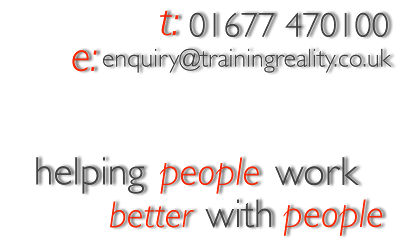Please press (at least!) one of these.
It costs you nothing, and (possibly) helps us spread the word!
Are you bold enough to stand out?
Friday, 2 February 2012
As everyone knows, you can't please all of the people all of the time. What intrigues me is just how much effort we expend trying to do just that; trying to be all things to all people, trying not to put limits on what we do, or trying to be inoffensive about what we do not do, and why we don't do it.
There are some classic examples of "pleasing all of the people" approach with corporate mission statements, or vision statements. These are, in many cases, drafted at great expense and with a lot of time and effort behind them, but very few really communicate much at all. To give a couple of real examples:
"Respect, integrity, communication, and excellence"
"To help people and businesses throughout the world realize their full potential"
I have three main issues with these statements:
- They don't actually say much about what the organisation does (or doesn't do);
- They don't really differentiate the organisation from any other; and
- They certainly don't get the blood flowing
Compare the above examples with one of my favourites, from Honda in the mid 1970's. It is clear about what the aim is, and, whether you agree with it or not, it gets the blood flowing:
We will destroy Yamaha
I think there has been a retreat from being bold in our language. In the public sector and the private sector; from CEO's to politicians, being inoffensive and bland in communication appears to be a highly valued skill. The issue with this is that, once everything becomes "vanilla", it ceases to be a flavour.
The lesson from ice-cream
Once something becomes ubiquitous, it loses power. Vanilla can be a beautiful flavour - I make my own custard at home, and cutting into the vanilla pod and scraping out the seeds is a wonderful moment. And yet "vanilla" has become a term of all that is dull, boring, unimaginative and uncreative, simply because is has become commonplace.
How to be bold
To stand out, to be different, to be memorable, takes boldness. You need to know that some people won't like it - and that's OK. You need to be comfortable with putting limits on what you do - and that's OK. You need to defend your decisions not to do things - and that's OK as well. Here are three quick ways of checking whether you stand a chance of standing out.
- Try to define the opposite of what you do or what you offer. It should be really easy, but in many cases this quickly flushes out how indistinct our offering is.
- Look at your marketing material, your sales pitch, even your mission statement. If you wrote the exact opposite of your material, would it make sense? It should.
- Explain to others what you do, what you don't do, and what your aims are. If everyone is comfortable with them, rewrite them until some are unhappy, and some are delirious. You should be making the blood flow.
To prove this point, take a little look around. Compare those organisations that people feel strongly about (positively and negatively) with those that people don't, that people really don't get excited about. Which group would you rather join?
Please press (at least!) one of these.
It costs you nothing, and (possibly) helps us spread the word!



